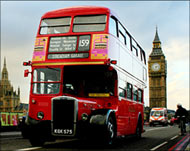Londoners bid farewell to bus icon
Londoners have said a fond farewell to the open-backed double-decker Routemaster bus that for half a century has been as synonymous with London as Big Ben.

Star of screen and song, loved by tourists and locals alike, the distinctive red buses have plied their trade since 1956 but they have been deemed expensive antiques and gradually retired since the 1980s.
Reporters and enthusiasts jostled for position and people lined the streets as the last Routemaster – the number 159 – set out on its journey on Friday morning from Oxford Street to Brixton bus garage in south London, ringing in the end of an era.
True to form, the bus left behind schedule. But in contrast to normal service, it was flanked by police outriders and well-wishers running alongside to catch a final glimpse.
|
“They are part of London. They are part of my history” John Rickard, |
The iconic double-deckers – with a conductor, cord-pull bells and an open rear boarding platform which allows passengers to jump on and off even when the bus is moving – are viewed by many as irreplaceable classics.
“They are part of London. They are part of my history,” retired electrician John Rickard, 70, told Reuters.
“The conductors made the trip special. You used to get some real characters. Sometimes it was like a one-man comedy show.”
Few other buses have fan clubs or a dedicated website, and fans claim that their replacement with driver-only buses will increase journey time because of the delay while the driver
collects the fares before the bus moves off.
Open air
 |
|
As much a part of London as |
“I love being out in the open air but it can get bitterly cold standing on the platform in winter,” said Lloyd Winston Licorish, 61, a conductor.
“Most customers are okay. Some of them even have a kind word and a cheery wave.”
Dubbed the “monarch of the road” by 1960s comic song-writing duo Michael Flanders and Donald Swan, the Routemaster has starred in a film alongside Cliff Richard, millions of tourist photographs and is considered as British as fish and chips.
“There is an enormous sort of emotional attachment to these buses,” said Travis Elborough, author of “The Bus We Loved” a homage to the buses, some of which travelled continent-busting distances during their long working lives.
Snub-nosed and light-bodied, with the driver enclosed in his cab, the last Routemaster was built in 1968. They had been designed to last no longer than 17 years.
Since the late 1950s countless visitors to London have climbed the narrow stairs and settled into the front seats for an inexpensive bird’s eye tour of the city’s top attractions.
At their peak 2760 trundled throughout London.
Romance
|
“There is an enormous sort of emotional attachment to these buses” Travis Elborough, |
While passengers will no longer be told to “hold very tight please” as the conductor gives the bell-cord two sharp tugs to signal the bus is leaving, not everyone will shed a tear.
The buses’ design effectively excluded many people with disabilities and parents struggling with pushchairs.
“While Routemasters were operating, certain people couldn’t use them,” Bert Massie, chairman of the Disability Rights Commission, told Reuters.
He said he understood the romance that surrounds the Routemaster. But he pointed out that a bus is a means of getting from A to B and should fulfill that role for all passengers.
“I have a certain sympathy with the whole nostalgia thing, but the world moves on,” Massie said.
But the buses will not completely disappear – a few will run on two London heritage routes for those who cannot let go.